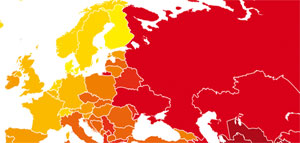Corruption Perceptions Index 2012 and the European Financial Crisis
December 7th, 2012
December 7th, 2012
Cross posted from Transparency International’s Space for Transparency blog.
 Europe’s rankings in the Corruption Perceptions Index 2012 are as diverse as the region itself.
Europe’s rankings in the Corruption Perceptions Index 2012 are as diverse as the region itself.
Clearly the perceived level of corruption in Greece (94th, the lowest EU state) is entirely different from that of Denmark and Finland, tied with New Zealand in first place. However, the old adage that corruption only occurs in the countries of the South, rings rather hollow.
With a score of 36, Greece ranks 94, together with Colombia, Benin, Djibouti, India, Mongolia and Senegal. Citizens of Italy (72nd), too, presumably will have pause for thought: sharing this rank with Bosnia and Herzegovina and Sao Tome and Principe, just before Bulgaria. In fact, Greece, Italy, Spain and Portugal, at the centre of the Euro crisis, were the four worst ranked countries in Western European countries in this year’s index.
The roots of crisis lie in varying factors from country to country, there is undeniably a link between corruption and the financial crisis, as the protestors on the streets of Athens, Rome, Lisbon and Madrid have been quick to point out.
Consider the recent story of the brave Greek journalist Kostas Vaxevanis arrested and tried for publishing a list of more than two thousand wealthy Greeks with Swiss bank accounts. The list had been lying unread on government desks for several years.
Leaving aside the blatant media gagging that the Vaxevanis case exemplifies, one also can ask why so many people allegedly were not paying taxes? Why did the Greek government fail to act as soon as they received the list? Why shoot the messenger, instead of looking into the allegations oftax evasion?
Vaxevanis, the Greek journalist now faces a retrial, even though he was found not guilty. The prosecutor believes the decision in the journalist’s favour “is legally wrong”; Vaxevanis’s explanation is that, “the prosecutor’s office …. [is] doing whatever they can to get the result they want”. The revelation of the list raises questions about whether there are credible, enforceable measures in place to ensure that people pay their taxes in line with all requirements of the rule of law.
One could ask questions of the European Commission as well, as Bloomberg News tried to do. However, the EU’s general court last week blocked an attempt to force the European Central Bank to release files showing how Greece used derivatives to hide its debt in the run-up to the financial crisis. Bloomberg brought the case under the EU’s freedom of information rule, but the court said disclosure of the documents, “would have undermined the protection of the public interest”. The ruling will mean that the question of whether EU officials knew of irregularities in Greece’s national accounts before they became public in 2009 will not be answered – at least, not for now.
The failure to put into place adequate measures to prevent, detect and root out legal and illegal forms of corruption is among the reasons for the financial crisis. It is obvious now that the public finances of countries like Greece, Italy, Portugal, Spain and Cyprus, and arguably the European Commission itself, were not sufficiently transparent and kept the debt crisis under the carpet for far too long.
But it’s far more complex as the Vaxevanis case illustrates – institutions like the judiciary, the audit office, political parties, the media, and so on, are like moving parts of a complicated machine – they all need to work, and work together, to allow the anti-corruption system to run smoothly and effectively. In Greece our TI chapter has done research showing that many of these institutions, political and business in particular, are failing the transparency test in Greece, and Vaxevanis’s case illustrates some of these institutional weaknesses.
In part because of the European crisis itself, the complacency about corruption is now being exposed and the link between corruption, or a lack of transparency, and the political process is increasingly being made by Europe’s citizens. Three quarters of them think corruption is major problem in their country, according to the 2012 poll. It was 98 per cent in Greece.
Corruption that perhaps was concealed by strong or stable economic growth is now, increasingly, being laid bare, with a commensurate loss of trust in the political system and in politicians. Some measures are being taken but it remains to be seen whether Europe’s governments will respond to the changing economic and political climate with further measures to strengthen anti-corruption efforts. They need to ensure that institutions are transparent, their leaders accountable and laws are rigorous and enforced.
Fighting corruption is not only essential for democracy, it makes good economic sense as well.